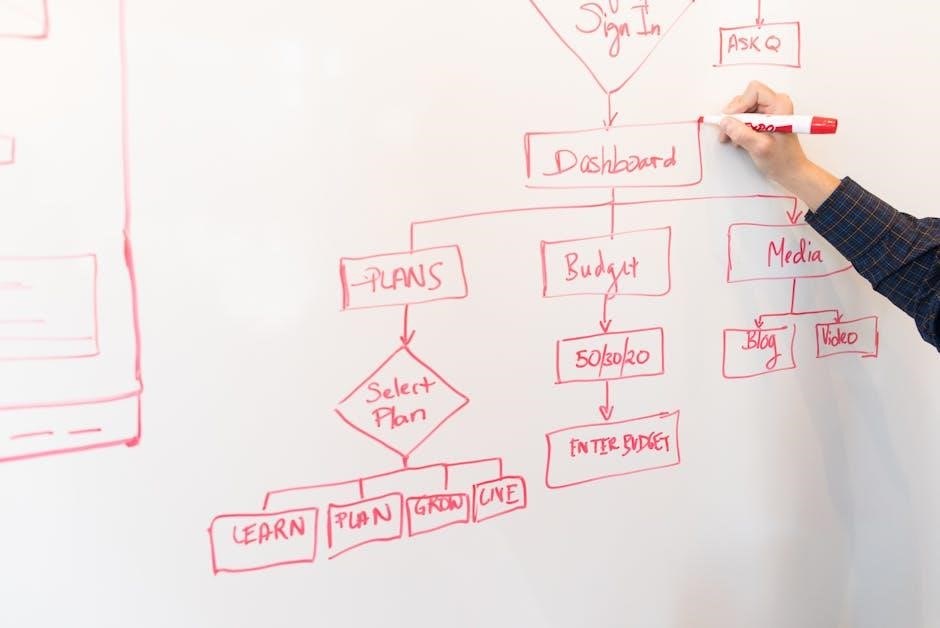Welcome to our comprehensive guide on Year 7 Scholarship Practice Tests․ Discover expert resources, past papers, and strategies to help your child excel in these exams․
1․1 Overview of Scholarship Exams for Year 7 Entry
Scholarship exams for Year 7 entry are competitive assessments designed to evaluate students’ academic abilities and potential․ They typically include multiple-choice questions and essays, covering subjects like mathematics, reading, and writing․ These exams are offered by providers such as ACER and Edutest, with varying formats and structures to test problem-solving and reasoning skills․ Preparation is key to success․
1․2 Importance of Practice Tests in Preparation
Practice tests are essential for preparing students for Year 7 scholarship exams․ They help identify strengths and weaknesses, allowing targeted improvement․ Practice tests also familiarize students with exam formats, timing, and question types, reducing anxiety․ Regular practice builds confidence, enhances problem-solving skills, and improves time management, crucial for success in competitive scholarship exams․

Types of Scholarship Exams
Scholarship exams vary by provider, with ACER, Edutest, and other organizations offering unique formats․ Each test type assesses different skills, ensuring a diverse evaluation of student abilities․
2․1 ACER (Australian Council for Educational Research) Tests
ACER tests are widely recognized for their rigorous assessment of student abilities․ They focus on problem-solving, numerical and verbal reasoning, and reading comprehension․ These exams are designed to identify high-achieving students, with questions that challenge critical thinking and analytical skills, preparing students for selective schools and scholarship opportunities effectively․
2․2 Edutest Format and Structure
Edutest exams for Year 7 scholarships feature five distinct sections, with four multiple-choice parts and one essay component․ The format includes both ability tests, focusing on problem-solving, and achievement tests assessing reading comprehension, mathematics, and written expression․ This structured approach ensures a comprehensive evaluation of a student’s academic and reasoning skills, aligning with selective school entry requirements․
2․3 Other Providers and Their Exam Styles
Besides ACER and Edutest, other providers offer unique exam formats․ Some include logic puzzles, word-based questions, and numerical reasoning tests․ These exams often feature additional sections like verbal reasoning and problem-solving exercises, designed to assess a wide range of skills․ They provide students with varied question types to apply strategies and identify improvement areas effectively․

Benefits of Using Practice Tests
Practice tests help identify strengths, develop strategies, and build confidence․ They reveal areas needing improvement, allowing focused preparation and reducing exam anxiety through familiarization with test formats and timing․
3․1 Identifying Strengths and Weaknesses
Practice tests reveal areas of excellence and improvement, enabling targeted preparation․ By analyzing results, students can focus on weaker subjects and build on strengths, optimizing their study time effectively․
3․2 Developing Test-Taking Strategies
Practice tests help students master techniques like time management, question prioritization, and error avoidance․ By simulating exam conditions, they learn to approach problems methodically, ensuring efficient use of time and minimizing mistakes during the actual test․
3․3 Building Confidence and Reducing Anxiety
Practice tests familiarize students with exam formats, reducing fear of the unknown․ Regular exposure builds problem-solving skills and confidence, while worked answers and explanations help students learn from mistakes, fostering a sense of preparedness and calm for the actual test day․

How to Prepare for Year 7 Scholarship Exams
Effective preparation involves utilizing practice papers, focusing on key subjects, and managing time efficiently․ Regular timed practice helps simulate exam conditions, building familiarity and confidence for the test day․
4․1 Utilizing Practice Papers and Past Exam Materials
Practice papers and past exam materials are essential for targeted preparation․ They help identify strengths and weaknesses, familiarize students with exam formats, and provide worked answers for better understanding․ Regular use of these resources ensures students are well-prepared for the actual test, aligning with formats like ACER and Edutest․
4․2 Time Management and Speed Practice
Effective time management is crucial for success in scholarship exams․ Practice tests under timed conditions help students adapt to exam pressure and improve speed․ Allocate specific minutes per question, focus on high-value questions first, and avoid wasting time on complex problems․ Regular speed practice enhances efficiency and reduces exam-day anxiety․
4․3 Focusing on Key Subjects: Mathematics, Reading, and Writing
Mastering mathematics, reading, and writing is essential for scholarship success․ Practice tests target problem-solving, numerical reasoning, and comprehension․ Strengthen essay-writing skills with sample prompts and feedback․ Regular review of worked answers enhances understanding and confidence, ensuring students excel in these critical areas of the exam․
Structure of Year 7 Scholarship Practice Tests
These tests typically include multiple-choice questions, essays, and problem-solving tasks․ They assess abilities like numerical reasoning, reading comprehension, and writing skills․ Time management and clarity are key․
5․1 Multiple-Choice Questions and Essay Components
Year 7 scholarship exams often feature multiple-choice questions testing core subjects like maths and reading․ Essays assess writing skills, creativity, and critical thinking․ Students must balance speed with accuracy to perform well in both formats, ensuring clear and structured responses to secure high scores․
5․2 Ability Tests vs․ Achievement Tests
Ability tests assess innate problem-solving and thinking skills, while achievement tests measure learned knowledge in subjects like maths and reading․ Understanding this distinction helps students prepare effectively, as ability tests focus on reasoning and achievement tests on curriculum-based content․
5․3 Sample Questions and Their Solutions
Sample questions and solutions provide students with a clear understanding of exam formats and content․ They help identify areas for improvement and build confidence․ Detailed solutions explain thought processes and strategies, enabling students to learn from mistakes and refine their problem-solving skills effectively․

Mathematics Scholarship Practice Tests
Mathematics scholarship practice tests focus on problem-solving, numerical reasoning, and practical applications․ They include geometry, algebra, and data handling exercises, preparing students for challenging exam questions and strategies․
6․1 Problem-Solving and Numerical Reasoning Questions
Problem-solving and numerical reasoning questions in Year 7 scholarship tests assess critical thinking and logical reasoning․ These questions often involve algebra, geometry, and data handling, requiring students to apply mathematical concepts to real-world scenarios․ Practice tests include worked examples to help students master these skills and build confidence in tackling complex problems effectively․
6․2 Geometry, Algebra, and Data Handling Exercises
Geometry, algebra, and data handling exercises in Year 7 scholarship tests require students to apply mathematical concepts to solve problems․ Questions cover shapes, equations, and interpreting graphs․ Practice tests include challenging scenarios to enhance problem-solving skills, with worked solutions provided to help students understand and improve their approaches to these fundamental areas of mathematics․
6․3 Worked Answers and Explanations for Key Problems
Worked answers and explanations for key problems provide students with detailed insights into solving complex questions․ These resources highlight common mistakes, offer step-by-step solutions, and clarify concepts․ By reviewing these explanations, students can identify gaps in their understanding and improve their problem-solving techniques effectively for the scholarship exams;

Verbal and Logical Reasoning Practice Tests
These tests assess critical thinking and problem-solving skills through logic puzzles, word-based questions, and reading comprehension․ They help students improve reasoning, vocabulary, and analytical abilities, preparing them for exam formats effectively․
7․1 Logic Puzzles and Word-Based Questions
Engage with logic puzzles and word-based questions to enhance critical thinking and problem-solving skills․ These exercises challenge students to decode patterns, interpret wordplay, and apply analytical reasoning․ Practice tests offer tailored questions, mirroring exam formats, with worked solutions to refine strategies and build confidence in tackling complex verbal and logical challenges effectively․
7․2 Reading Comprehension and Vocabulary Tests
Reading comprehension and vocabulary tests assess a student’s ability to interpret complex texts and understand advanced terminology․ Practice tests include passages and word-based questions, designed to refine analytical skills and broaden linguistic knowledge․ These exercises mirror exam formats, providing detailed explanations to enhance learning and improve performance in verbal assessments․
7․4 Strategies for Tackling Complex Verbal Questions
Mastering complex verbal questions requires effective strategies like breaking down sentences, identifying key words, and using context clues․ Practice tests help refine these skills, enabling students to approach problems methodically․ Worked examples and explanations provide insights, ensuring students understand how to decode and answer challenging verbal reasoning questions with confidence and precision․

Time Management Tips for Scholarship Exams
Effective time management is crucial for success․ Allocate time wisely to each section, practice under timed conditions, and avoid common time-wasting mistakes during exams․
8;1 Allocating Time to Each Section Effectively
Develop a well-structured time allocation plan to balance your effort across all sections․ Allocate specific time percentages to reading comprehension, mathematics, and reasoning․ Practice tests help identify time-wasting patterns, enabling adjustments for optimal performance and ensuring all questions are attempted within the exam duration․
8․2 Practicing Under Timed Conditions
Simulate exam conditions by setting strict time limits for each section․ Use digital timers to track progress and ensure adherence to allocated minutes per question․ This practice enhances speed, accuracy, and decision-making under pressure, helping students manage their time effectively and reduce anxiety during the actual test․
8․3 Avoiding Common Time-Wasting Mistakes
Identify and minimize time-wasting habits, such as overthinking questions or re-reading instructions repeatedly․ Prioritize answering easier questions first to secure early points․ Practice skipping complex questions initially and returning to them later, ensuring efficient use of time and maximizing overall scores in timed conditions․ Stay focused and maintain a steady pace․

Recommended Resources for Scholarship Preparation
Access comprehensive resources, including practice tests, past papers, and expert strategies, to boost your child’s success in Year 7 scholarship exams․ Utilize ACER, Edutest, and SubjectCoach materials․
9․1 Free Online Practice Tests and Guides
Explore free online practice tests and guides from reputable providers like ACER, Edutest, and SubjectCoach․ These resources offer multiple-choice questions, essays, and worked answers, helping students familiarize themselves with exam formats and improve their skills effectively․
9․2 Paid Tools and Subscription Services
Premium resources like Edutest and SubjectCoach offer comprehensive practice tests with detailed explanations․ These paid tools provide timed exams, progress tracking, and expert feedback, helping students refine their skills and gain a competitive edge in scholarship exams․ Subscriptions often include interactive exercises tailored to exam formats․
9․3 Expert Preparation Programs and Workshops
Expert programs like Edutest and SubjectCoach offer structured workshops with qualified educators․ These sessions simulate real exams, providing personalized feedback and interactive exercises․ Designed for Year 6 students, they focus on key subjects, helping students adapt to exam formats and improve performance through tailored strategies and progress tracking․

Analyzing Worked Answers and Explanations
Analyzing worked answers helps identify mistakes and improve problem-solving skills․ Detailed explanations provide clarity, enabling students to understand errors and refine their approach for better performance in exams․
10․1 Learning from Mistakes in Practice Tests
Learning from mistakes in practice tests is crucial for improvement․ By reviewing errors, students can understand gaps in knowledge and develop better strategies․ Analyzing incorrect answers helps build resilience and enhances problem-solving skills, leading to better performance in future exams․
10․2 Understanding Test Marking Criteria
Understanding test marking criteria is essential for maximizing scores․ By familiarizing yourself with how exams are graded, students can focus on what examiners value, such as clear communication or logical reasoning․ This insight helps align answers with assessment expectations, improving overall performance and confidence․
10․3 Applying Feedback to Improve Performance
Applying feedback effectively is key to enhancing exam performance․ Analyze mistakes, identify patterns, and create targeted study plans․ Use worked answers to understand correct methods and revise weaker areas․ Regularly practicing with feedback fosters improvement, builds confidence, and refines test-taking skills over time․

Success Stories and Tips from Past Candidates
High scorers share strategies like consistent practice and time management․ Motivational advice includes staying focused, overcoming exam nerves, and aiming high to achieve academic success․
11․1 Strategies That Worked for High Scorers
High scorers emphasize consistent practice, mastering time management, and focused revision․ They highlight the importance of understanding exam formats, practicing under timed conditions, and reviewing worked solutions to improve problem-solving skills and build confidence, ensuring readiness for the actual scholarship exam․
11․2 Motivational Advice for Aspiring Scholars
Stay focused, set realistic goals, and maintain a positive mindset․ Persevere through challenges, embrace feedback, and celebrate small achievements․ Surround yourself with supportive mentors and peers․ Remember, success is a journey—hard work, dedication, and belief in your abilities will pave the way to achieving your scholarship aspirations․
11․3 Overcoming Exam Day Nerves and Challenges
Stay calm by practicing deep breathing and positive affirmations․ Familiarize yourself with the exam format and arrive early to reduce anxiety․ Focus on your preparation and tackle questions methodically․ Remember, challenges are opportunities to showcase your skills and resilience․ Trust in your abilities and approach the exam with confidence․
Summarizing key strategies, consistent practice, and a positive mindset are essential for success․ Utilize past papers, manage time effectively, and stay confident to achieve your goals․
12․1 Summarizing Key Takeaways for Effective Preparation
Consistent practice with past papers helps identify strengths and weaknesses․ Time management and strategies for tackling complex questions are crucial․ Regular review of worked solutions enhances understanding and improves performance․ Staying motivated and focused ensures readiness for the exam, fostering confidence and reducing anxiety․
12․2 Staying Focused and Motivated Leading Up to the Exam
Set clear goals and maintain a consistent study routine to stay focused․ Celebrate small achievements to boost motivation․ Use practice tests to build familiarity and confidence․ Surround yourself with supportive family, friends, and mentors to stay positive and driven throughout your preparation journey․
12․3 Encouragement for Students to Aim High
Believe in your potential and strive for excellence․ Persevere through challenges and embrace opportunities to grow․ Aim high to unlock your full potential and achieve greatness․ Every effort counts, and your dedication will pave the way for future success․ Stay determined, passionate, and committed to reaching your goals․









































































